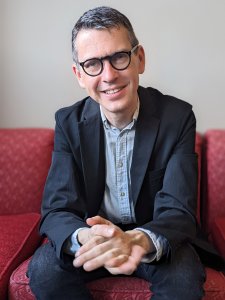Presented By: Lieberthal-Rogel Center for Chinese Studies
LRCCS Noon Lecture Series | Michelangelo Antonioni, Tourist Snapshots, and the Politics of the “Backward Scene” 落后镜头 in 1970s China
Gavin Healy, Postdoctoral Fellow, Lieberthal-Rogel Center for Chinese Studies, University of Michigan

If you would like to attend via Zoom, please register at https://myumi.ch/m72mg
This talk examines how China’s late-Cultural Revolution era campaign against Michelangelo Antonioni’s documentary film "Chung kuo/Cina" spilled over into stricter management of foreign tourist photography and production of new forms of tourist literature by state publishers as China’s tourism market expanded in the 1970s. Examining how notions of China’s “backwardness” implicated photographic practices on the ground, this case study illuminates how government officials regulated tourist photography, how those regulations were understood by foreign tourists, and how guides and ordinary citizens entered into the visual discourse of tourism on their own terms.
Gavin Healy is a postdoctoral fellow at the Lieberthal-Rogel Center for Chinese Studies at the University of Michigan. He completed his PhD at Columbia University in May 2021, and was a postdoctoral fellow there in the 2021-22 academic year. His current monograph project, “The Political and Cultural Economy of Sightseeing: Foreign Tourism in the ‘New China’ (1949-1978),” examines how personnel within China’s state tourism bureaucracy struggled to balance the use of tourism as a form of political, historical, and cultural representation with the demands of developing a revenue-generating service industry in a socialist economy.
This talk examines how China’s late-Cultural Revolution era campaign against Michelangelo Antonioni’s documentary film "Chung kuo/Cina" spilled over into stricter management of foreign tourist photography and production of new forms of tourist literature by state publishers as China’s tourism market expanded in the 1970s. Examining how notions of China’s “backwardness” implicated photographic practices on the ground, this case study illuminates how government officials regulated tourist photography, how those regulations were understood by foreign tourists, and how guides and ordinary citizens entered into the visual discourse of tourism on their own terms.
Gavin Healy is a postdoctoral fellow at the Lieberthal-Rogel Center for Chinese Studies at the University of Michigan. He completed his PhD at Columbia University in May 2021, and was a postdoctoral fellow there in the 2021-22 academic year. His current monograph project, “The Political and Cultural Economy of Sightseeing: Foreign Tourism in the ‘New China’ (1949-1978),” examines how personnel within China’s state tourism bureaucracy struggled to balance the use of tourism as a form of political, historical, and cultural representation with the demands of developing a revenue-generating service industry in a socialist economy.